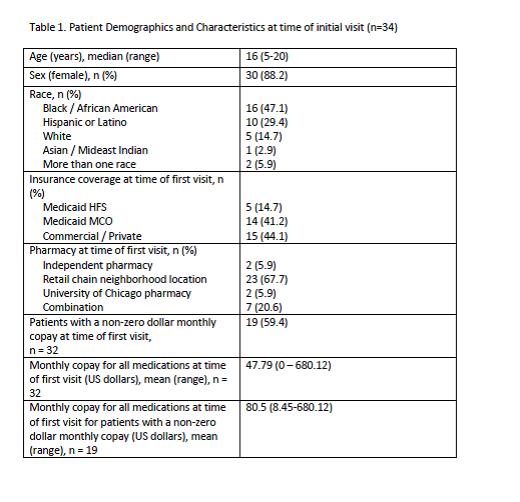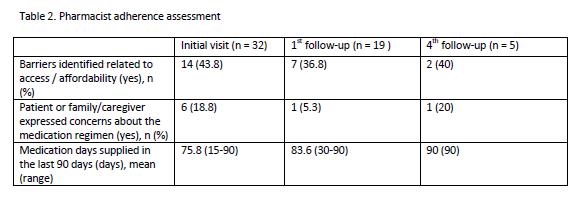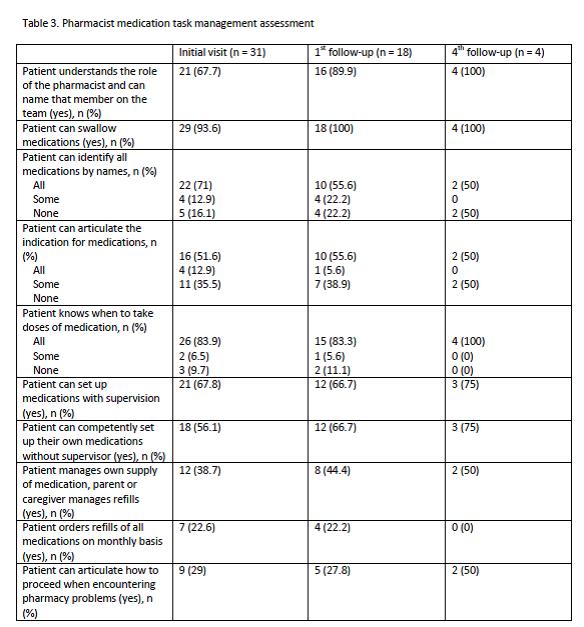Session Information
The 2020 Pediatric Rheumatology Symposium, originally scheduled for April 29 – May 2, was postponed due to COVID-19; therefore, abstracts were not presented as scheduled.
Date: Saturday, May 2, 2020
Title: Poster Session 3
Session Type: ACR Abstract Session
Session Time: 4:15PM-5:15PM
Background/Purpose: Systemic lupus erythematous (SLE) is an autoimmune disease in which the body produces pathogenic autoantibodies that cause inflammation resulting in multi-organ damage. A SLE diagnosis in childhood or adolescence often equates to more severe disease with higher renal, neurologic and hematologic involvement than adults. Children with pediatric SLE often require complex regimens of immunosuppressive medications to control the disease and prevent flares. In recent years, the incorporation of pharmacists as a part of the care team for patients with chronic conditions, including cystic fibrosis and HIV, has been described. Pharmacists have been shown to improve patient and physician satisfaction, improve patients’ medication understanding and adherence, and decrease medication related errors. The University of Chicago Medicine (UCM) Comer Children’s Hospital established a complex lupus clinic in January 2019 with a multidisciplinary care team which includes a clinical pharmacist. Although there is some literature on pharmacist interactions and interventions with rheumatology patients, this is confined primarily to inpatient or specialty pharmacy settings. The purpose of this project is to describe the pharmacist role in a multidisciplinary pediatric lupus clinic and the impact it has on patient care.
Methods: Patients were scheduled for 15-30 minutes with the pharmacist as part of their extended clinic appointment. Pharmacist assessments were performed at initial and follow-up visits, and included a medication reconciliation, adherence review, and medication management tasks review. Patients and caregivers were given the opportunity to ask questions as well as provided a pill box. If appropriate, medication management task “homework” was assigned. All patients were offered the option of transferring their prescriptions to the on-site outpatient pharmacy and eligible patients enrolled in financial assistance programs.
Results: Among the 34 patients seen by a pharmacist during clinic appointments, median age was 16 years old, 88.2% were female, and 47.1% were black. Additional patient demographic information is presented in Table 1. At the time of the first appointment, only 67.7% of patient or caregivers reported already having a relationship with a pharmacist. Adherence assessment data is reported in Table 2. Medication management task completion by patients is reported in Table 3. The most common pharmacist education topics were review of indications for drug(s) and bone health recommendations. The most common pharmacist interventions were weight-based dose adjustment of hydroxychloroquine and de-escalation of long-standing stress ulcer prophylaxis regimens.
Conclusion: Our initial findings demonstrate that pharmacists involvement in a multidisciplinary pediatric lupus clinic can improve patient’s understanding of non-pharmacologic and pharmacological therapies, improve patient adherence, and provide support to patients as they take on additional medication management tasks.
To cite this abstract in AMA style:
Rotolo S, Cameron G, Edens C, Talevski C. Pharmacist Role in an Outpatient Adolescent Complex Pediatric Lupus Clinic [abstract]. Arthritis Rheumatol. 2020; 72 (suppl 4). https://acrabstracts.org/abstract/pharmacist-role-in-an-outpatient-adolescent-complex-pediatric-lupus-clinic/. Accessed .« Back to 2020 Pediatric Rheumatology Symposium
ACR Meeting Abstracts - https://acrabstracts.org/abstract/pharmacist-role-in-an-outpatient-adolescent-complex-pediatric-lupus-clinic/



